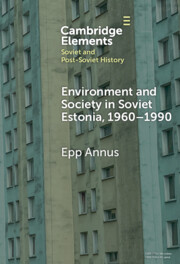Refine search
Actions for selected content:
1 results

Environment and Society in Soviet Estonia, 1960–1990
- An Intimate Cultural History
-
- Published online:
- 07 April 2025
- Print publication:
- 08 May 2025
-
- Element
-
- You have access
- Open access
- HTML
- Export citation
